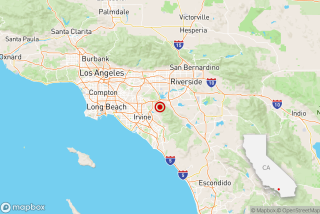U.S. Official Takes Farmers’ Side on Smelt
A Bush administration official has helped California farmers in a campaign to eliminate endangered species protections for the delta smelt, a tiny fish that has bedeviled Central Valley irrigators, an environmental group has charged.
The smelt, each about the size of a person’s little finger, have a penchant in dry years for clustering around the gigantic pumping stations that send water from the Sacramento-San Joaquin River Delta to farms and urban areas in the southern half of the state.
Since the fish was declared an endangered species in 1993, pump operators have been required to throttle back on their equipment when swarms of smelt draw near. This keeps the tiny fish from being sucked in and killed.
Farmers have been campaigning to remove the fish from the government’s list of endangered species, arguing that they are not as rare as government biologists thought. Taking the smelt off the list would allow more water to be pumped south.
In 2002, the California Farm Bureau and a pair of Central Valley water agencies went to court to force the government to review the smelt population. The review, completed in the spring, concluded that the fish was still endangered. Recently, the farm group went back to court, arguing that the review had been inadequate.
As part of their filing with the court, lawyers for the Farm Bureau argued that the review had been criticized within the government. The lawyers pointed to an e-mail forwarded to them by Julie MacDonald, the Interior Department’s deputy assistant secretary for fish, wildlife and parks, in which she criticized the review of the smelt population as “oversimplified and misleading.”
“She provided them the ammo they needed to go back to court,” said Trent Orr, a legal counsel for Earthjustice, a nonprofit environmental law firm. “This whole thing has the feeling of an overly cozy relationship between regulator and regulated.”
“It may not be illegal. But it certainly doesn’t seem kosher,” Orr said.
A spokesman for the Interior Department, which oversees the U.S. Fish and Wildlife Service, said Friday that the agency could not comment on the accusation because of the litigation.
An attorney for the Farm Bureau accused Earthjustice of mounting an election-year attack intended to hurt President Bush and help Democratic challenger John Kerry.
“If Earthjustice could accuse the delta smelt itself of being against them they would, because it’s that time of year -- a presidential election year,” said Brenda Southwick, the Farm Bureau’s legal counsel for natural resource issues. “It’s a smoke screen.”
The population review by the Fish and Wildlife Service “was a bunch of gobbledygook,” Southwick said, adding that the Farm Bureau would have filed to reopen its lawsuit even if MacDonald had not released her e-mail.
The accusations are the latest in a flurry by environmentalists who accuse Bush administration officials of politicizing the Endangered Species Act.
In the Pacific Northwest, timber interests sued to force status reviews of two endangered birds -- the northern spotted owl and the marbled murrelet -- hoping to show that the species had recovered sufficiently to allow increased logging. The reviews indicated the owl and murrelet still required protection, but administration officials have balked at officially filing the findings.
Recently, Gary Frazer, head of the endangered species program at the Fish and Wildlife Service, was forced to step aside after conflicts with political appointees in the Interior Department -- in particular MacDonald, whose job gives her oversight of the Fish and Wildlife Service. In her e-mail about the smelt, MacDonald wrote that it was critical to present a fair characterization of the smelts’ status “to the public and our partners,” but that the wildlife service’s review documents “do no such thing.”
“The facts represented by the service provide an oversimplified and misleading characterization of what is happening” to the fish population, she wrote.
In a response the next day, Michael Fris, Fish and Wildlife’s endangered species program manager for California and Nevada, said he was “distressed” over MacDonald’s response.
“We tried to incorporate your comments wherever we could, and I think that we did so in nearly all instances,” wrote Fris, who was unavailable for comment Friday.
Central Valley farmers hired their own biologists several years ago to study the smelt population. Those scientists determined that the fish had shown a robust ability to bounce back from the epic drought that hit the state in the late 1980s and early ‘90s.
Orr said that MacDonald was “playing fast and loose with the notion that there is no good science on the fish.”
While no absolute population number exists for the tiny fish, which wander in schools throughout the delta, scientists believe they have a good fix on population trends.
Those trends point to maintaining the smelt on the endangered species list, Orr said.
More to Read
Start your day right
Sign up for Essential California for news, features and recommendations from the L.A. Times and beyond in your inbox six days a week.
You may occasionally receive promotional content from the Los Angeles Times.






